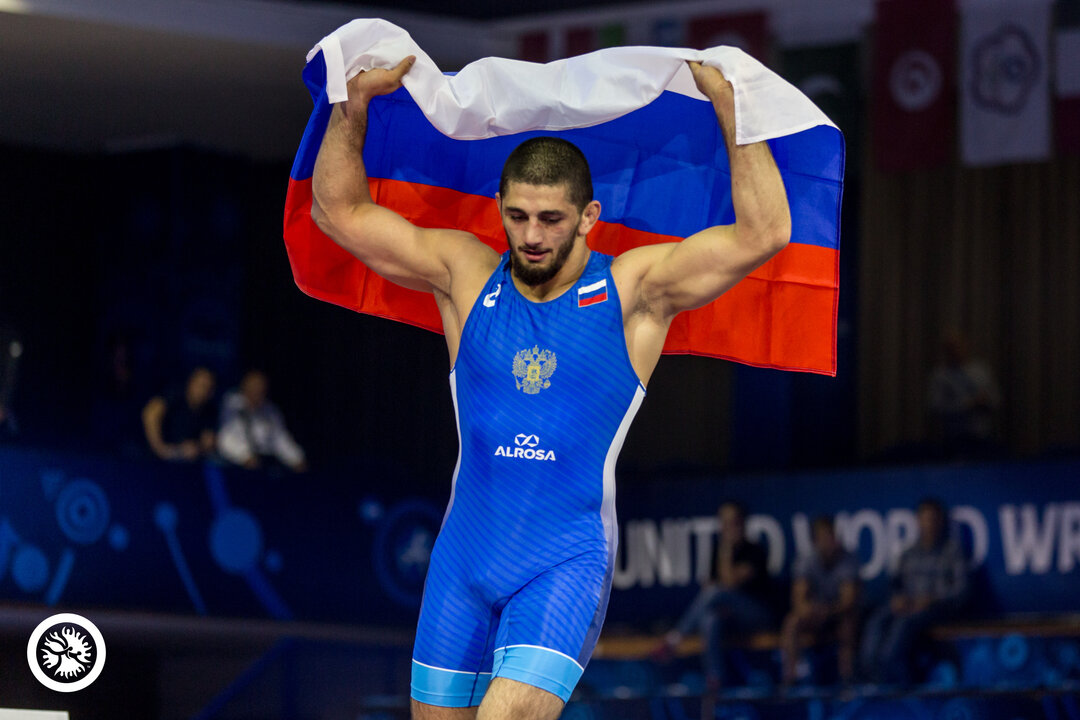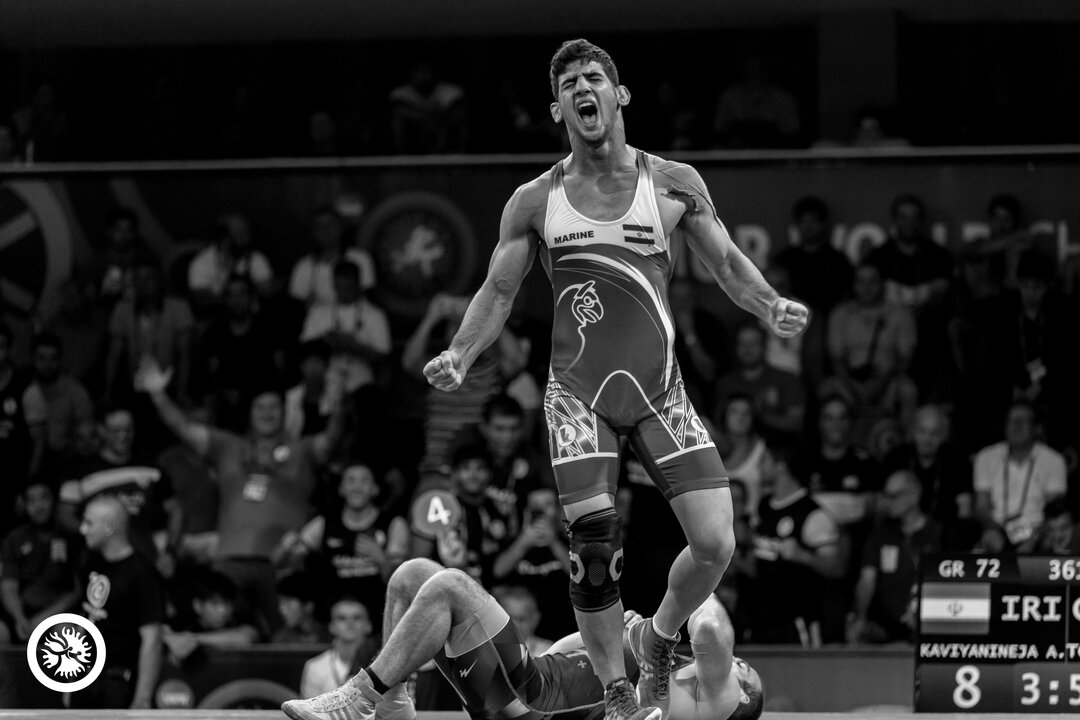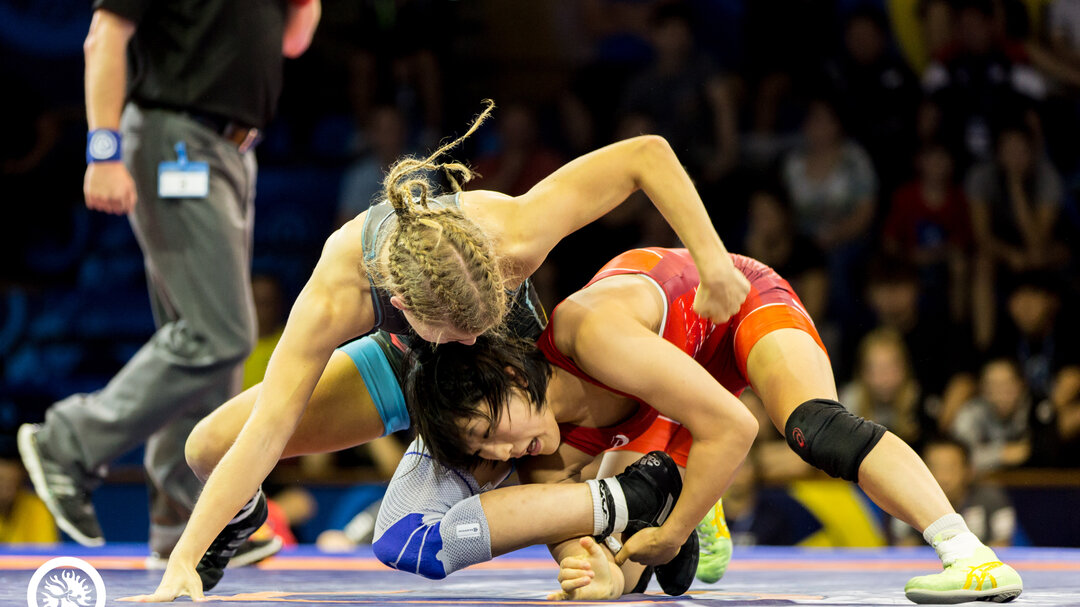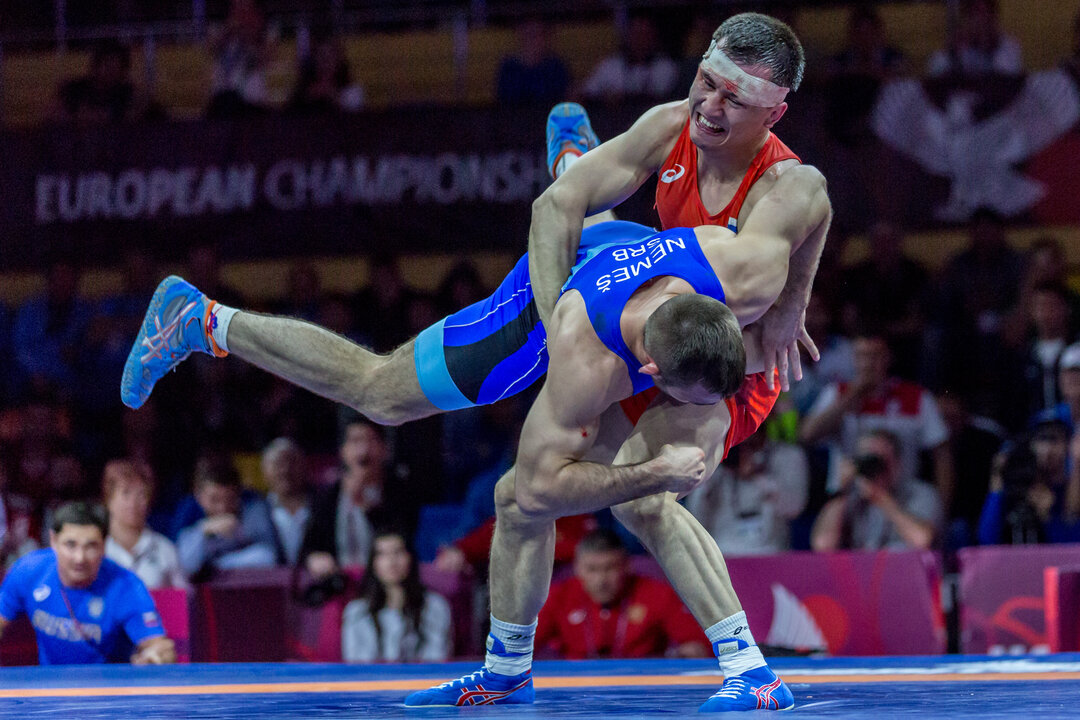AMMAN, Jordan (March 24) -- Asian Championships 2025 enters day two with Greco-Roman weights 60kg, 67kg, 72kg, 82kg and 130kg wrestlers on the mat. Uzbekistan won three gold medals on day one with Iran and Japan winning one each.
WATCH LIVE | LIVE MATCH ORDER | DAY 1 RESULTS
97kg gold medal bout: Mohammadhadi SARAVI (IRI) vs Yuri NAKAZATO (JPN)
14:32: Yuri NAKAZATO (JPN) earns a shot at the Olympic champion in the 97kg final by edging Youfang ZHANG (CHN) 3-2. The two traded stepouts with a fleeing point added on, with Nakazato's coming second to put him ahead on criteria 2-2. Nakazato gets the passivity point in the second period and opts to remain the standing position. It doesn't result in any more points for him, but neither is Zhang able to break through the Japanese wrestler's defenses.
14:25: Mohammadhadi SARAVI (IRI) storms into the 97kg final with a technical superiority win over NITESH (IND). He scores a takedown and then gets the par terre advantage. Nitesh defends the first attempt for gut but Saravi persists and turns, which breaks Nitesh and Saravi adds two suplexes, both for two points each.
82kg gold medal bout: Omar SATAYEV (KAZ) vs. Mohammad NAGHOUSI (IRI)
14:20: Mohammad NAGHOUSI (IRI) gets a stepout and a fortunate call on a challenge to defeat former compatriot Shahin BADAGHIMOFRAD (QAT) 4-3 and advance to the 82kg final. Badaghimofrad gets the first chance at par terre, but Naghousi reverses, then receives a second point when the Qatari unsuccessfully challenges for a foul. With Naghousi up 2-1 in the second period, Badaghimofrad retakes the lead with a nice go-behind takedown. In the final seconds, Naghousi uses a slick duck under to a body lock, but has to settle for a stepout. Iran challenges for a fleeing point, and they get it! With eight seconds left, a stunned Badaghimofrad lets the time run out with no effort.
14:11: Unheralded Omar SATAYEV (KAZ) rocks defending champion Taizo YOSHIDA (JPN) in the 82kg semifinal with two big throws and a fall. Satayev, leading 2-0, hit a big counter throw for four and then headlock for four. He held Yoshida on the mat and secured a first-period fall.
72kg gold medal bout: Danial SOHRABI (IRI) vs Abdullo ALIEV (UZB)
14:07: Abdullo ALIEV (UZB) assures he will improve on his bronze medal from a year ago when he defeats Issei HONNA (JPN) 6-1 to advance to the 72kg final. Aliev starts fast and hard with a takedown followed by a roll and a 2-point throw for a quick 6-0 lead. Honna picks up a point when Uzbekistan unsuccessfully challenges a possible takedown that would have ended the match. In the second period, there are no scoring chances nor passivity calls.
13:59: Danial SOHRABI (IRI) gets the par terre and then turns Ji LENG (CHN), gets the suplex for four before adding another roll to win 9-0 and enter the final at 72kg.
67kg gold medal bout: Saeid ESMAEILI (IRI) vs Razzak BEISHEKEEV (KGZ)
13:55: There was no second miracle comeback for 2023 Asian Games champion Katsuaki ENDO (JPN), who falls 5-1 to Razzak BEISHEKEEV (KGZ) in the 67kg semifinals. Beishekeev, looking to avenge a quarterfinal loss to Endo at the Asian Games, starts strong with a 4-point throw from par terre. Endo gets his chance in the second period and, although he lifts Beishekeev off the mat, he can't get the leverage for a turn. Beishekeev manages to run out the clock and earn a chance to add an Asian gold to his silver from last year and bronze in 2023.
13:50: In the Iran-Uzbekistan battle which Uzbekistan won yesterday, Iran seems to dominate it today. The 67kg semifinal between Olympic champion Saeid ESMAEILI (IRI) and Nozimjon BOYKUZIEV (UZB) ends in Esmaeili winning 8-0. Esmaeili scored a takedown, added another before rolling Boykuziev for the win.
60kg gold medal bout: Se Ung RI (IRI) vs Alisher GANIEV (UZB)
13:40: Pouya NASERPOUR (IRI) defended the par terre position in the first period against Se Ung RI (PRK) in the 60kg semifinal but Ri isn't waiting for par terre advantages in the second period. He scores a takedown and then blocks a arm-throw attempt from Nasepour for another two points and leads 5-0. However, after a review among the referees, the arm-throw is scored four points for Naserpour and then a takedown for Ri who now leads 6-4. Naserpour with a deperate attempt to score but Ri circles for go-behind and wins 8-4. He will face Alisher GANIEV (UZB) in the final.
13:34: Alisher GANIEV (UZB) starts his 60kg semifinal against Akyl SULAIMANOV (KGZ) in good form, using a duck under for a takedown and immediately going to a gut wrench for a 4-0 lead. Ganiev gets the passivity call, and he wastes no time hitting a 2-point throw, then repeats the move. Sulaimanov, knowing it's over, doesn't resist and officially the match ends in a fall at 2:04.
Semifinals at 13:30 local time
13:18: Yuri NAKAZATO (JPN) puts in the strides and works for an 8-0 win against Melis AITBEKOV (KGZ) to enter 97kg semifinal
13:18: Omar SATAYEV (KAZ) hits a pair of 4-point rolling flip throws to knock off Boseong KANG (KOR) 11-0 in the 82kg quarterfinals. That earns Satayev a final-four clash with defending champion Taizo YOSHIDA (JPN).
13:14: Two-time Asian U23 medalist and 2022 world U23 bronze medalist NITESH (IND), looking for his first senior medal, gets off to a good start, rolling Ilyas GUCHIGOV (KAZ) four times from par terre for a 9-0 victory in 1:58 and place in the 97kg semifinals.
13:12: Akyl SULAIMANOV (KGZ) chalks up a quick 4 points against Aslamjon AZIZOV (TJK) in their 60kg quarterfinal, then holds on for a 4-3 victory.
13:10: Mohammad NAGHOUSI (IRI) gets a second chance at par terre and manages to turn Bekzat ORUNKUL UULU (KGZ), with another point tacked on for an unsuccessful challenge, for a 4-1 win and a place in the 82kg semifinals. At best, Orunkul Uulu can only aim for a second straight bronze medal
13:10: Olympic champion Mohammadhadi SARAVI (IRI), in his first competition after Paris, opens with an 8-0 technical superiority win over Amanberdi AGAMAMMEDOV (TKM) and enters the semifinals at 97kg
13:04: Youfang ZHANG (CHN) blocks an attempted turn from Bekhruz BARNOEV (UZB) in par terre and wins the 97kg bout 5-1. Zhang had built a 3-1 lead from par terre in the first period.
13:03: Razzak BEISHEKEEV (KGZ), looking to improve on his silver medal from a year ago, proves too much for NEERAJ (IND), storming to a 9-0 victory in less than two minutes in their 67kg quarterfinal.
13:00: Paris Olympic gold medalist and defending Asian champion Saeid ESMAEILI (IRI) gets his campaign started at 67kg with a 10-4 win in the quarterfinals over Man Gwang SON (PRK). Esmaeili gives up an early takedown, but gets down to work, scoring a stepout and a takedown to take the lead, then adds a takedown-roll combination to go into the break leading 7-2. Esmaeili starts the second period with a stepout, before Son fights back with a takedown to cut the lead to 8-4. But Esmaeili gains another takedown before running out the clock.
12:58: World U23 champion Alisher GANIEV (UZB) breaks open a close match in the second period before securing a victory by fall over Ziyue XI (CHN) to advance to the semifinals at 60kg.
12:55: Shahin BADAGHI (QAT) gets four gut-wrenches after put in par terre to win 8-0 against RAHUL (IND) and advance at 82kg.
12:50: Likui SHI (CHN) kept defending champion Taizo YOSHIDA (JPN) quiet in the first period of their 82kg bout with Yoshida getting only one point for par terre. However, Shi tried a bodylock but Yoshida put him on the back for two points, a turn added two more as Yoshida won 5-0.
12:48: Issei HONNA (JPN) spots Yryskeldi KHAMZAEV (KGZ) to start their 72kg quarterfinal, but hits a dazzling back suplex that sends Khazaev sailing into the air and onto his back, where Honna secures the fall.
12:47: A classic high-octane matchup is up on Mat C between Paris Olympic bronze medalist Se Ung RI (PRK) and Kaito INABA (JPN) for a place in the 60kg semifinals. Ri takes the lead by getting behind for a takedown, then gets the top in par terre. Ri adds a roll to go up 5-0. Inaba gets a pair of stepouts on each side of the break, but Ri comes roaring back with a pair of arm throws, one for 2 points and the second for 4 that is upheld on challenge. In the end, a 12-2 win for Ri.
12:42: In the final qualification-round match, Bekhruz BARNOEV (UZB) overwhelms Ibrahim FALLATAH (KSA) for a 9-0 victory to earn a spot in the 97kg quarterfinals.
12:42: Pouya NASERPOUR (IRI) builds a 6-2 lead over SUMIT (IND) in the 60kg quarterfinal and there is no more action in the second period and Naserpour is the winner as he advances to the semifinal.
12:37: The tournament gets an early Iran-Uzbekistan match-up as world U23 champion Mohammad NAGHOUSI (IRI) takes on 2024 Asian bronze medalist Mukhammadkodir RASULOV (UZB) in the qualification round at 82kg. Rasulov gets the passivity point in the first period, but can't add to his tally. In the second period, Naghousi gets his chance, and he also fails to turn his opponent. Neither can break the other's defenses the rest of the way and Naghousi advances with a 1-1 win on criteria.
12:30: Katsuaki ENDO (JPN) needs to thank his coach and the challenge as he mounts an incredible comeback from 7-0 down to stun Lei LI (CHN) in their 67kg quarterfinal and win 9-7. Li scored a stepout and then got par terre . He scored a turn to lead 4-0. A suplex was awarded four points and Endo was docked two points for foul with Li declared 10-0 winner. Japan challenged the call and on review, Li's last throw was only a two-pointer with no foul. Endo, down 6-0, got par terre in the second period, went for the grand amplitude throw to make it 7-6 and added two turns to win 9-7. Incredible bout!
12:29: Abdullo ALIEV (UZB), the other returning bronze medalist at 72kg, opens with a 2-point throw from par terre against Begmyrat NOBATOV (TKM) for a 3-0 lead. Nobotov gets his chance in the second period, but can't budge Aliev. Aliev adds a stepout and he's into the semifinals with a 4-1 win.
12:23: Returning bronze medalist Ji LENG (CHN) gets a 4-point throw from par terre in the second period and advances at 72kg with a 5-1 win over Loiqi AMIRKHONZODA (TJK).
12:21: Two-time former bronze medalist NEERAJ (IND) hangs on for a 3-1 win over Ali ALBIDHAN (IRQ) to secure a place in the last eight at 67kg.
12:15: Danial SOHRABI (IRI) had to wait on the sidelines of the mat for his 72kg quarterfinals against Kuldeep MALIK (IND) but doesn't take his time on the mat and finishes the bout 8-0. Takedown, exposure and two rolls are enough for the win.
12:14: Yuri NAKAZATO (JPN), a 2023 world U23 bronze medalist, storms to a 12-1 win over Jewoo PARK (KOR) to advance to the 97kg quarterfinals.
12:10: The 97kg bout between Eduard BABENOSHEV (TJK) and Amanberdi AGAMAMMEDOV (TKM) goes to the second period but 49 seconds in, Agamammedov wins 9-0 and enters the quarterfinals at 97kg.
12:07: Meirzhan SHERMAKHANBET (KAZ), the 2022 champion at 67kg and a former world bronze medalist, starts his campaign with an 11-5 to Minseong KWON (KOR). Shermakhanbet gets a 4-point lift-and-dump throw from par terre, but then has to spend nearly 20 seconds fighting off his back after Kwon slams him to the mat with a 4-point bear hug. Kwon is given an additional 2 points for a leg foul to lead 6-5. Kwon gets the passivity call in the second period and all but ends any chance for a comeback by adding a 4-point throw.
12:05: RAHUL (IND) battles out of a 7-point hole to defeat Habibjon ZUHUROV (TJK) 10-7 and advance at 82kg.
12:00: Another bout over in first period. Likui SHI (CHN) gets the par terre and then rolls to a 9-0 win over Toyly ORAZOV (TKM) in just over a minute at 82kg.
11:57: In a wild match at 72kg, Adilkhan SATAYEV (KAZ) trails on criteria 2-2 in the second period when he hits Yryskeldi KHAMZAEV (KGZ) with a 4-point front headlock. Khazaev fights out of near fall and reverses for 2. Kyrgyzstan challenges for a foul, but is unsuccessful, giving Satayev a 7-4 lead, only to see Khazaev bull him to the mat for a takedown, a move upheld on challenge, leaving Satayev ahead 7-7 on criteria. The instant the match resumes, Khamzaev charges Satayev straight to his back for 4 and he holds on for an 11-7 win.
11:55: SUMIT (IND) could not turn Minwoo KIM (KOR) from par terre in the first period but manages to roll to a 9-0 win and advance at 60kg.
11:49: Mat A is moving quickly! Man Gwang SON (PRK) rolls to a 9-0 win over Mcclaren Ravin MARREN (SGP) at 67kg and then former world U23 champion Katsuaki ENDO (JPN) needs only four minutes to beat Sunat ABDULLOEV (TJK) 9-0 at 67kg.
11:47: Kaito INABA (JPN), the silver medalist at 60kg a year ago in Bishkek, gets a 2-point exposure from par terre for a 3-0 lead over Bakytzhan KABDYL (KAZ), then counters an arm spin for a 2-point takedown. In the second period, he shrugs behind for 2, then ends the match by twisting Kabdyl over from the standing position for a 9-0 win.
11:45: Begmyrat NOBATOV (TKM) builds up to a 9-0 win over Ahmed M BARAHMAH (KSA) in the 72kg bout and wins via technical superiority in two minutes and five seconds.
11:40: Loiqi AMIRKHONZODA (TJK) with a headlock throw against JASON BAUCAS (PHI) and then holds Baucas in the danger position till the break as the referees calls them to return to their corners. The score is 8-0 and Amirkhonzoda is the winner.
11:38: Seyed SOHRABI (IRI) gets Iran started with an 8-0 victory over Omar AL DARAGHMEH (JOR) at 72kg that he ends just before the end of the first period.
11:36: Will we see another young Japanese with little international experience take home a gold? Issei HONNA (JPN) hits a 4-point throw and goes on to quickly defeat Yeonghun NOH (KOR) 8-0 at 72kig.

 df. Zachery Samuel ELAM (USA) -by VSU, 11 - 0-6.jpg) Magomedkhan MAGOMEDOV (RUS) beat Zachery Samuel ELAM (USA), 11-0 to win the 97kg gold medal at the Junior World Championships. (Photo by Max Rose-Fyne)
Magomedkhan MAGOMEDOV (RUS) beat Zachery Samuel ELAM (USA), 11-0 to win the 97kg gold medal at the Junior World Championships. (Photo by Max Rose-Fyne) df. Nikoloz TCHIKAIDZE (GEO) -by VFA, 12 - 2-7.jpg) Amin KAVIYANINEJAD (IRI) flexes after scoring the 12technicalcal superiority victory over Nikoloz TCHIKAIDZE (GEO) in the Greco-Roman 72kg finals. (Photo by Max Rose-Fyne)
Amin KAVIYANINEJAD (IRI) flexes after scoring the 12technicalcal superiority victory over Nikoloz TCHIKAIDZE (GEO) in the Greco-Roman 72kg finals. (Photo by Max Rose-Fyne)  df. Ellen RIESTERER (GER) -by VSU, 10 - 0-10.jpg) In the 50kg finals, Yui SUSAKI (JPN) beat Ellen RIESTERER (GER) to win her fifth world title in three different age groups. (Photo by Max Rose-Fyne)
In the 50kg finals, Yui SUSAKI (JPN) beat Ellen RIESTERER (GER) to win her fifth world title in three different age groups. (Photo by Max Rose-Fyne) df. Viktor NEMES (SRB) -by VPO1, 5 - 1-2.jpg) Roman VLASOV (RUS) defeated Viktor NEMES (SRB), 5-1 to win the 2018 European gold medal. Photo by Max Rose-Fyne.
Roman VLASOV (RUS) defeated Viktor NEMES (SRB), 5-1 to win the 2018 European gold medal. Photo by Max Rose-Fyne.

Share your thoughts.
Comments